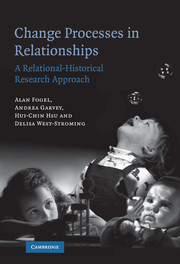Book contents
- Frontmatter
- Contents
- List of figures
- List of tables
- Acknowledgments
- Prologue Overview of the research problem and summary of findings
- 1 Relationships as developing systems: theoretical foundations
- 2 Mother-infant relationship development in the first six months: from face-to-face play to object play
- 3 Relational-historical research on developmental change
- 4 Relational-historical research: the multiple case study approach, frame analysis, qualitative and quantitative analysis
- 5 Research propositions about relationship change processes
- 6 Research methods for the current investigation: subjects, procedures, and data analysis
- 7 Results of the current investigation: quantitative analysis of developmental changes in relationship frames and in infant actions
- 8 Results of the current investigation: qualitative analysis of Richard and his mother
- 9 Results of the current investigation: qualitative analysis of Betsy and her mother
- 10 Results of the current investigation: qualitative analysis of Lewis and his mother
- 11 Results of the current investigation: qualitative analysis of Susan and her mother
- 12 Summary of findings on relational-historical change
- Epilogue Laws of change: implications for theory and practice
- References
- Author index
- Subject index
Epilogue Laws of change: implications for theory and practice
Published online by Cambridge University Press: 22 September 2009
- Frontmatter
- Contents
- List of figures
- List of tables
- Acknowledgments
- Prologue Overview of the research problem and summary of findings
- 1 Relationships as developing systems: theoretical foundations
- 2 Mother-infant relationship development in the first six months: from face-to-face play to object play
- 3 Relational-historical research on developmental change
- 4 Relational-historical research: the multiple case study approach, frame analysis, qualitative and quantitative analysis
- 5 Research propositions about relationship change processes
- 6 Research methods for the current investigation: subjects, procedures, and data analysis
- 7 Results of the current investigation: quantitative analysis of developmental changes in relationship frames and in infant actions
- 8 Results of the current investigation: qualitative analysis of Richard and his mother
- 9 Results of the current investigation: qualitative analysis of Betsy and her mother
- 10 Results of the current investigation: qualitative analysis of Lewis and his mother
- 11 Results of the current investigation: qualitative analysis of Susan and her mother
- 12 Summary of findings on relational-historical change
- Epilogue Laws of change: implications for theory and practice
- References
- Author index
- Subject index
Summary
Come gather 'round people
Wherever you roam
And admit that the waters
Around you have grown
And accept it that soon
You'll be drenched to the bone.
If your time to you
Is worth savin'
Then you better start swimmin'
Or you'll sink like a stone
For the times they are a-changin'
(Bob Dylan, 1964)In this chapter, we review our findings from the perspective of consistencies of developmental change processes. We ask whether general laws of change in relationships can be inferred from our research. We also discuss the implications of such laws of change for understanding practices that foster developmental change in relationships. Such practices include childrearing, education and training, clinical treatment approaches based primarily on interpersonal relationships, change processes in organizations, and larger scale social and cultural change.
Are there laws of relational-historical development?
In this section, we recognize some of the consistencies of the developmental process that emerged in our work, knowing that these consistencies must await further study. Our research revealed different types of change, from the realtime fluctuations of communicative actions to the developmental changes in the patterns of communication. We also observed the paradoxical situation that change occurred in the midst of stability. The dynamics of change occurred with respect to frames that had a stable identity across the period of observation. While spontaneous, creative innovations were observed during periods of developmental re-organization, change was not entirely open ended. It was constrained to occur in certain ways and not others.
Information
- Type
- Chapter
- Information
- Change Processes in RelationshipsA Relational-Historical Research Approach, pp. 230 - 255Publisher: Cambridge University PressPrint publication year: 2006
